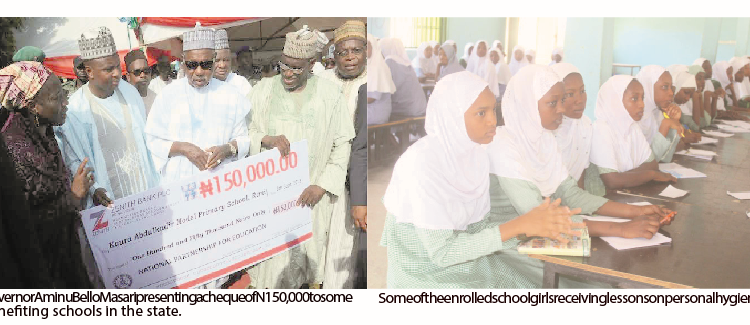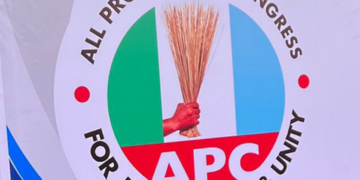Nigeria has the highest number of out of school children, with an estimate of over 10 million children, mostly girls not attending school, hence being deprived of the fundamental right to education.
According to reports released by the National School Census (NSC) in 2006, a confirmed net enrolment ratio of 80.6 per cent suggested a substantial proportion of 19 per cent of primary school pupils aged between 6-11years are out of school nationwide. This consequently represents about 5 million children of the same age bracket that do not have access to primary education.
The recent figures released by UNICEF also specified that over 10 million girls in Nigeria are currently out of school due to several factors detrimental to them.
Indeed, the situation has been a major concern, especially in the northern region where only 20 per cent of females have access to formal education due to poverty, insufficient infrastructure or resources, cultural or religious barriers, environmental intimidation as well as insecurity bedevilling the area.
It is conscious of the need to provide indigenes and indeed residents with quality education that the Katsina State governor, Aminu Bello Masari has prioritised education in his restoration agenda, with special attention to the education of a girl children to curb the peril in the state.
The government since its inception, has spent over N15 billion in executing several projects and programmes in education, which greatly facilitated the development of schools at all levels and has been outstanding.
Given the foregoing, the Masari administration had signed a multi-billion naira Memorandum of Understanding (MoU) with the United Nations Children Fund (UNICEF) in 2016 in the critical sectors of education and health.
This spurred several remarkable interventions in the state, motivating school pupils to attend class as well as getting those out of school enrolled.
One of the key projects that seriously modified the educational system, was the disbursement of girls’ scholarship, the Female Teacher Trainee Scholarship Scheme (FTTSS) under the support of the Nigeria Partnership for Education Project (NIPEP), flagged off in Rimi Local Government Area of the state.
The scheme has empowered the girl-child in schools across the three senatorial zones of the state, where the government designated the sum of N1, 727,010,000 to build up access to basic education, with special attention to the girl-child.
According to information gathered, no fewer than 61,873 girls said to have received the sum of N20,000 each, with 36,865 beneficiaries from the primary one, 17,045 girls from primary two and 7,963 girls were also selected from primary three respectively.
In its determination to refurbish girl child education in the state, the administration also doled out N250, 000 to each of the School-Based Management Committees from the selected schools, while 1,845 pre-primary and Integrated Qur’anic schools received N150, 000 each.
Governor Aminu Bello Masari while distributing the funds to the beneficiaries, said: “The objective of the girls’ scholarship is to support parents in ensuring that girl-child attends school regularly, as the School Improvement Grant (SIG) is to support School-Based Management Committee (SBMC) to implement minor activities in their respective schools that will assist in enlarging enrolment, retention and completion for all pupils.
“For the FTTSS, 361 female teachers have been supported with the sum of N50, 000 each to further their education and obtain the minimum teaching qualification of NCE. The FTTSS programme has led to a significant increase in gross enrolment of pupils from 86 per cent in 2016 to 89 per cent in 2017. The transition from primary school to junior secondary school increased from 71 per cent in 2016 to 82 per cent in 2017, and teacher, pupils ratio reduced from 1:160 in 2016 to 1. 76 in 2017 and gender parity index reduced from 0:77 in 2016 to 0.84 in 2017,” he said.
Also, the tremendous gain has been made in the GEP-3 UNICEF project which plans to return about one million girls to school to finish their basic education and acquire skills for livelihood, as well as enhance the capacity of teachers to effectively deliver quality learning to the girls.
Approximately 292 primary schools and Integrated Quranic Schools (IQs) across Batsari, Baure, Faskari, Ingawa, Jibia, Kankara, Kankia, Sabuwa and Rimi Local Governments of the state, are benefiting from the GEP-3 project with a significant number of girls being enrolled in schools across the local governments.
From the 2018/2019 academic session assessment, enrollment of girls in schools across the nine local governments has increased from 1,065,217 to 1,134,327 in the 2019/2020 academic year at a low level of basic education in the state.
In furtherance to this, there are also 7,913 IQs and non-IQs centres with the enrollment of 677,530 female learners, issued as the 2021 end-of-year review report by the state Universal Basic Education Board (SUBEB).
In this wise, the UNICEF in partnership with the government, integrated over 53,000 Almajirai across 55 Islamiyya schools in the state in Western education, and enrolled over 40,000 out-of-school children in different schools across the state. As part of the plan to integrate 110,000 Almajirai under the GEP3 project.
On the Girls’ education project, no fewer than 300 School Based-Management Committees (SBMC) members have been trained on effective tools for managing, improving schools and creating awareness. While schools supported through the GEP-3, also developed school emergency preparedness and response plans to mitigate the impact of potential and actual threats in schools.
To prevent terrorist attacks in schools, multi-sectoral task teams and school safety have been established across the 34 local government areas of the state, to provide quick networking among actors with more priority on the safety of the girls who are most vulnerable to such scourge.
Also, 60 junior secondary schools were developed for emergency and plans were tested, evacuation drills and accelerated learning programmes, implemented in various communities with the target of 160,000 (96,000 girls).
Speaking more on the Global Partnership Education Project (GEP) in the state, the commissioner for Education, Prof. Badamasi Lawal Charanchi, said the project had supported the Nigerian government with $100 million to address issues related to education service delivery, particularly on the basic level of girl-child education.
He added that Katsina was among the five states that are benefiting from the project, which will run for four years, and already the third tranche of the disbursement exercise was done in the state.
He further explained that in furtherance of the efforts of refurbishing education in the state, the government has constructed numerous secondary schools across the three senatorial zones of the state.
He said: “This is in addition to the rehabilitation, renovation and upgrading of over 120 secondary schools across the state. At the basic level, about 3,000 classrooms have been renovated, rehabilitated and upgraded. Instructional materials of over N154 million have been procured to add quality to education in the state.
“Another N136 million has been earmarked for the provision of computers to 18 secondary schools under the science and technology education board. Just recently, the state government has expended the sum of over N400 million for payment of SSCE examination for 29,000 Katsina State indigenes.”
Also, the Anaemia Reduction in School and Non-School Girls (ARISING), has made tremendous assistance in the health and sustainable education of the adolescent boys and girls in 45 schools across 45 communities in the three pilot local governments (Rimi, Kankia and Kafur) in the state.
The UNICEF Country Representative in the state, Phadmabathi Yelda, while applauding the state’s effort on enrolment of girl-child in primary schools, said the project provided an opportunity to educate boys and girls on their roles and responsibilities in future, stating further that the project also aimed at exploring ways in which communities can be engaged to address issues of health, education and nutrition by a way of expanding their knowledge on critical issues.
Thanking Governor Masari-led government for improving the health and nutrition situation of children and women, especially in the areas of polio eradication, improvement in routine immunisation, as well as policies and guidelines on Primary Healthcare Under One Roof (PHCUOR), and tackling of nutritional status of children.
Also noting that, with the support of the state government, more girls have completed primary and secondary education, as the nutrition programme continues to deal with iron deficiency among the adolescent girls in the schools.
Yelda said, reaching out with nutrition interventions to about 20 million girls with the average age of marriage being 15 years, assisted in reducing anaemia as well as conserved the lives of many adolescent girls from maternal death and children from malnutrition in future.
Similarly, the state project coordinator, Mr Oyedokun Oluniyi, who explained the baseline assessment carried on adolescent nutrition conducted in the LGAs, shows a 32.18 per cent prevalence of anaemia among adolescents in the intervention areas and 37.5% prevalence in control LGA.
According to him, over 200, 000 adolescent boys and girls received the tablets from the 2,790,000 supplements supplied weekly in schools and communities, according to the baseline assessment survey they conducted, adding that they are planning to scale up the project to other parts of the state even with the constraints of finance.
Depicting measures in place for the successor of the project, he said asides from the operational training manual developed and M&E data tools planned, they also formed a state nutrition strategic plan revised to incorporate adolescent nutrition, provision of IFAS, community participation leading to demand creation and engagement of 45 Teachers, 45 health workers and 45 community focal persons who were trained on adolescent project.
LEADERSHIP, however, visited some of the pilot schools where the exercise is being dispensed to the adolescent children in and out of schools in Kankia LGA, where most of the students, teachers and other beneficiaries appreciated the state government and UNICEF for the intervention, pleading for the sustenance of the project
The village head of Kankia ( Magaji Gari), Abdulahi Hassan Sada, who doubles as the chairman of the programme in Kankia, said a lot of women and children have benefited from several UNICEF projects which have increased their access to healthcare and education at no cost.





